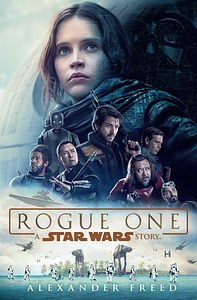Take a photo of a barcode or cover
A wonderful adaptation of the film's screenplay. Fulfilled my one requirement that an adaptation must: provided useful insight into the qualities of the characters.
Wow. That was . . . amazing.
It was everything the movie was, minus the fantastic soundtrack.
I loved how Freed dived into every character--main or not--and made you LOVE them, then weep after they died. Except for Krennic.
I actually kinda liked Krennic in the movie; I understood his frustration and his love for the Death Star. But this novel swept that away and made him the villian we can all despise properly. Thumbs up for that.
The Vader Scene, as I call it (the very end when he kills everybody), was a less dramatic here though, which saddened me. Probably because of the lack of music.
But really, this was amazing.
It was everything the movie was, minus the fantastic soundtrack.
I loved how Freed dived into every character--main or not--and made you LOVE them, then weep after they died. Except for Krennic.
I actually kinda liked Krennic in the movie; I understood his frustration and his love for the Death Star. But this novel swept that away and made him the villian we can all despise properly. Thumbs up for that.
The Vader Scene, as I call it (the very end when he kills everybody), was a less dramatic here though, which saddened me. Probably because of the lack of music.
But really, this was amazing.
This book was everything I could have wanted!! It followed the storyline of the movie but gave more insight where necessary and it filled in the holes of what the characters were thinking and feeling !!! I absolutely loved it !!! And it still had me crying like a baby by the end !!! Wonderfully done and fully deserving of the 5 stars :D
Novelizations usually fall short of the films they are based on. This book, however, is a refreshing exception. While describing the action laid out in the film in an engaging enough way that I didn't get bored, Freed also gives us added depth to the characters we already love. It gave us an insight into their lives and their struggles both under the Empire and fighting with the Rebellion. The inner monologues of characters such as Cassian, Jyn and Bodhi was perfect and it really added new layers to their characters. Loved it.
Getting used to the writing was difficult at the beginning. Once it picked up momentum I really enjoyed it. I liked the depth we got in the characters that wasn't apparent in the movie.
movie adaptation. low expectations. not badly written, lets you into the character s and but more but no great revelations or deleted scenes.
Really good, and I liked that it had so much of Baze's POV but I wish it had had Chirrut's more than once.
Rogue One is easily one of my top-3 favorite Star Wars movies, if not one of my favorite movies just in general. I’ve seen it countless times and loved it more and more with every watch. So when I heard there was a novelization, and that it was actually *good* (a friend sent me quotes to convince me; I was easily convinced), I picked it up immediately.
And this didn’t disappoint. It tells the story that I know and love, but it goes beyond that, turning it into something much richer than you get on screen. The book shows you the inner workings of all the characters, their struggles and triumphs. It makes everything—all the inspiration and loss and hope—that much more poignant and that much more heartbreaking. I’m so glad I read this, and I can’t wait to rewatch the movie again with this extra context in mind.
And this didn’t disappoint. It tells the story that I know and love, but it goes beyond that, turning it into something much richer than you get on screen. The book shows you the inner workings of all the characters, their struggles and triumphs. It makes everything—all the inspiration and loss and hope—that much more poignant and that much more heartbreaking. I’m so glad I read this, and I can’t wait to rewatch the movie again with this extra context in mind.
Alexander Freed -- My hero!
As someone who loved the film Rogue One, I was excited to read the novelisation.
Things I loved:
- Tarkin and Krenic’s voice mail.
- Galen's inbox
- Jedha tourism information
- A poor woman thinking her breaking a relationship rite smote Jedha city
- Bodhi "defecting from his defection" (I laughed so hard reading that line)
Like the film, I know I will reread this many times. Do I hope it’s no surprise this book is on my recommendation list?
As someone who loved the film Rogue One, I was excited to read the novelisation.
Things I loved:
- Tarkin and Krenic’s voice mail.
- Galen's inbox
- Jedha tourism information
- A poor woman thinking her breaking a relationship rite smote Jedha city
- Bodhi "defecting from his defection" (I laughed so hard reading that line)
Like the film, I know I will reread this many times. Do I hope it’s no surprise this book is on my recommendation list?
Rogue One may be literally the only thing that could have held my attention for the entire length of a trans-Atlantic plane flight. I started it in the airport minutes before boarding, and from that iconic opening musical theme and the famous line, “A long time ago, in a galaxy far, far away...” I was captivated. I saw the movie when it came out in 2016, and my memory of the overall plot was still fairly good, but the details had faded just enough that each scene felt simultaneously familiar and fresh.
A lot of book lovers are derisive of movie novelizations, but if you're going to novelize a movie, you deserve to start with a great movie like Rogue One. It's the prequel the original Star Wars trilogy always deserved, that explains one of the great questions the original Star Wars left us all asking for decades: How is it that the supposedly impregnable Death Star has this one fatal weakness that can theoretically be exploited by a single small fighter dropping a torpedo?
One of the great things about novelizing a film is that you literally never have to complain about how the movie wasn't true to the book. A good novelization takes the story that was told in the movie and fleshes it out to fill in, with all the detail readers crave, the rich emotional texture and understory that's told in a glance or a line or two of dialogue in the film. Freed accomplishes that beautifully.
Jyn Erso in particular is more richly realized here, and is much more than just the badass action heroine she was in the movie. Her emotional journey here is both deep and painful. She's been abandoned by those she trusts most not just once, but over and over, and her heart is a stone. Until the stone cracks and she must confront the specter of the father who abandoned her, the coward, the traitor, the monster... who is still alive and who has never stopped loving her. The man she hates more than almost anyone else... and whose love she still craves.
There are also interesting "Supplemental Data" segments that add details you won't see in the movie, like the private musings of Mon Mothma on how the Clone Wars drastically altered the nature of warfare by introducing massive numbers of droid and clone soldiers and the tactics that go with them, and hilariously passive-aggressive chains of emails among the Death Star development team.
Audio Notes: This audio performance is SO GOOD. Jonathan Davis is one of my favorite narrators anyway, and it would have been good if it were just Davis and a microphone doing a standard narration, but it vreads more like a full-cast audio production complete with sound effects. The voices of certain characters are altered so that K2SO sounds like a droid, Darth Vader sounds like Darth Vader, and stormtroopers sound like they're talking through suit radios. Each scene has characteristic background sounds, like the deep thrum of the Death Star and the sounds of the jungle on Yavin 4, that keep you very firmly grounded in where the action is happening. And there are live sound effects at key points, so that you literally hear the laser shots and explosions, and the sounds of Jyn and Cassian running away through the mud in the pouring rain. The technical aspects of putting all these various background sounds behind Davis's narration are very well done – the music and sounds effects never overwhelm Davis.
A lot of book lovers are derisive of movie novelizations, but if you're going to novelize a movie, you deserve to start with a great movie like Rogue One. It's the prequel the original Star Wars trilogy always deserved, that explains one of the great questions the original Star Wars left us all asking for decades: How is it that the supposedly impregnable Death Star has this one fatal weakness that can theoretically be exploited by a single small fighter dropping a torpedo?
One of the great things about novelizing a film is that you literally never have to complain about how the movie wasn't true to the book. A good novelization takes the story that was told in the movie and fleshes it out to fill in, with all the detail readers crave, the rich emotional texture and understory that's told in a glance or a line or two of dialogue in the film. Freed accomplishes that beautifully.
Jyn Erso in particular is more richly realized here, and is much more than just the badass action heroine she was in the movie. Her emotional journey here is both deep and painful. She's been abandoned by those she trusts most not just once, but over and over, and her heart is a stone. Until the stone cracks and she must confront the specter of the father who abandoned her, the coward, the traitor, the monster... who is still alive and who has never stopped loving her. The man she hates more than almost anyone else... and whose love she still craves.
There are also interesting "Supplemental Data" segments that add details you won't see in the movie, like the private musings of Mon Mothma on how the Clone Wars drastically altered the nature of warfare by introducing massive numbers of droid and clone soldiers and the tactics that go with them, and hilariously passive-aggressive chains of emails among the Death Star development team.
Audio Notes: This audio performance is SO GOOD. Jonathan Davis is one of my favorite narrators anyway, and it would have been good if it were just Davis and a microphone doing a standard narration, but it vreads more like a full-cast audio production complete with sound effects. The voices of certain characters are altered so that K2SO sounds like a droid, Darth Vader sounds like Darth Vader, and stormtroopers sound like they're talking through suit radios. Each scene has characteristic background sounds, like the deep thrum of the Death Star and the sounds of the jungle on Yavin 4, that keep you very firmly grounded in where the action is happening. And there are live sound effects at key points, so that you literally hear the laser shots and explosions, and the sounds of Jyn and Cassian running away through the mud in the pouring rain. The technical aspects of putting all these various background sounds behind Davis's narration are very well done – the music and sounds effects never overwhelm Davis.





